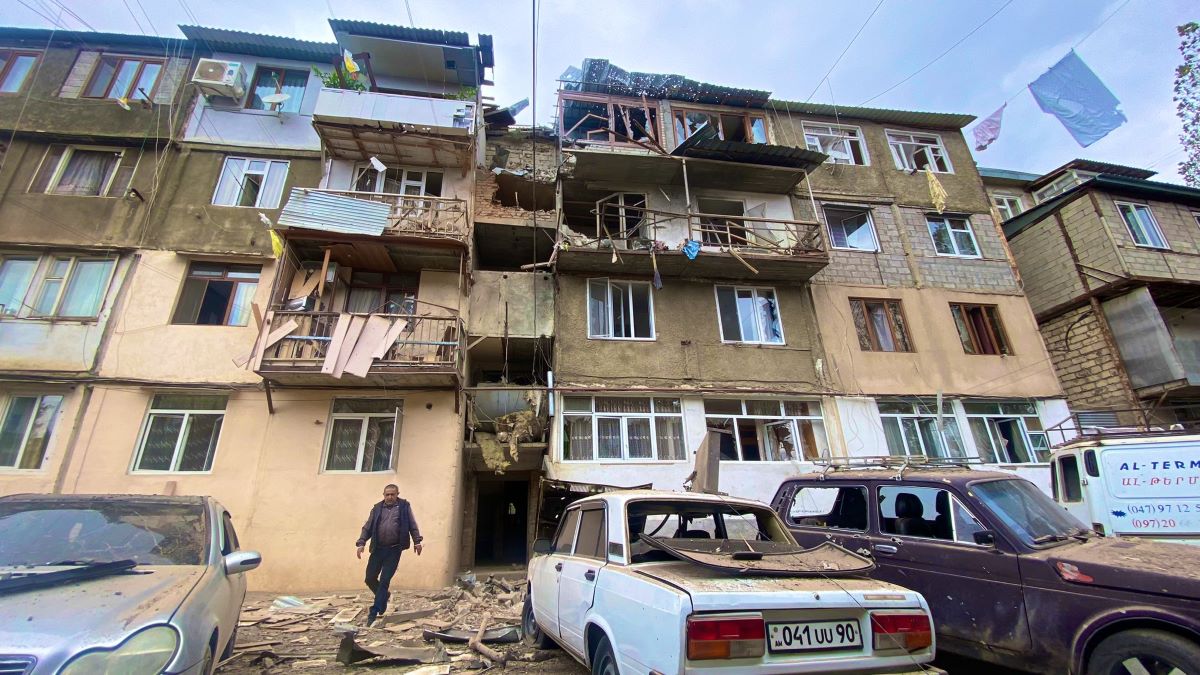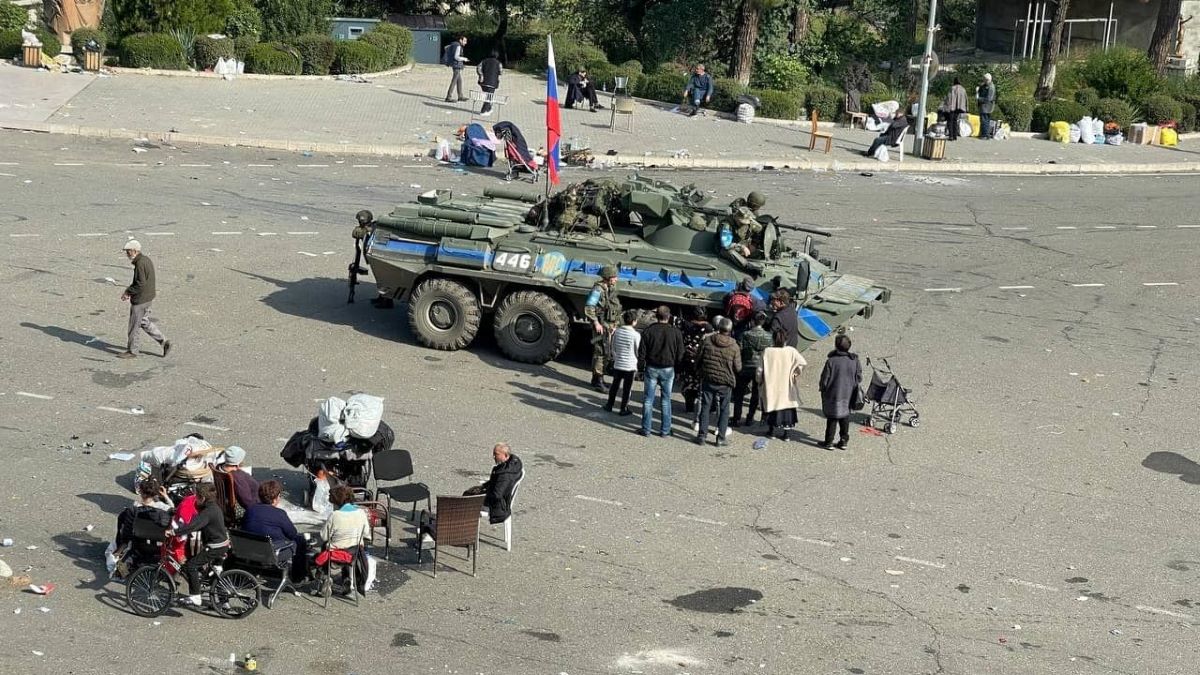Myanmar is currently embroiled in a civil war with numerous armed ethnic and pro-democracy factions fighting the military junta which threw an elected government out of power in a sudden coup in 2021.

Outlook Web Desk

UPDATED: 27 NOV 2023 1:25 PM
Beijing has called for an immediate ceasefire in Myanmar's escalating civil conflict. This comes after a group of armed people, including the Myanmar National Democratic Alliance Army (MNDAA), Arakan Army (AA), and Ta'ang National Liberation Army (TNLA), took control of an important trading spot between the two countries over the weekend.
Myanmar, a South-East Asian nation of 54 million people, is currently embroiled in a civil war with numerous armed ethnic and pro-democracy factions fighting the military junta which threw an elected government out of power in a sudden coup in 2021.
The armed alliance's offensive against the Aung Min Hlaing-led junta has resulted in the rebels gaining control of numerous military positions and a strategically significant town for trade with China. The junta government has acknowledged losing at least three towns, posing the toughest armed challenge to the junta since its ascent to power three years ago.
In response, China's People's Liberation Army (PLA) expressed determination to safeguard border security in an editorial published on Sunday by PLA Daily, the news website of the Chinese military.
“Maintaining the security and stability of the China-Myanmar border is the common aspiration and well-being of the two peoples,” it said.
“China pays close attention to the relevant conflicts in northern Myanmar and urges relevant parties to immediately cease fire and engage in peaceful dialogue to avoid escalation of the situation.”
There have been confirmed Chinese casualties and reports of damage on the Chinese side of the border since the conflict broke out in October.
China does not officially recognise the junta government but has maintained good relations with the administration and repeatedly insisted that it would not interfere in Myanmar’s internal affairs.
AFC Cup tie moved after Australia denies Myanmar team visas
The match between Shan United and Macarthur will now be played in Thailand.

SYDNEY: An AFC Cup match between teams from Australia and Myanmar has been moved to a neutral venue in Thailand after Canberra refused to grant visas to the visiting side, Football Australia said today.
Shan United were scheduled to play Australian club side Macarthur in Sydney on Thursday as part of the second-rung regional club competition.
But Football Australia said there was “no viable way of playing the game on Australian soil” after officials refused to grant visas to the touring Myanmar side.
The match “has been moved to BG Stadium in Bangkok, Thailand”, it added.
Football Australia did not explain why the visas had been denied, and Australia’s home affairs department did not immediately respond to requests for comment.
Human rights groups have previously raised concerns about alleged links between Shan United and Myanmar’s military junta.
The Macarthur side was criticised in October after travelling to play in Myanmar against official government advice.
Myanmar's spiraling violence spawns
strategic risks for India
Northeastern border instability, possible Chinese inroads worry analysts

KIRAN SHARMA,
NEW DELHI -- Fierce fighting in Myanmar has raised "deep concern" in India, which is closely monitoring security along the countries' shared border while bracing for an influx of refugees.
The military regime that seized power in Myanmar in February 2021, ousting the democratically elected government of Aung San Suu Kyi, is facing arguably its biggest test yet in the form of a coordinated armed resistance. The renewed instability has raised alarm in countries that border the troubled Southeast Asian state, including rival powers India and China.
Operation 1027 -- as the resistance offensive is named, after the date it started in late October -- "has shaken the military" in Myanmar, observed Udai Bhanu Singh, a strategic analyst formerly with the New Delhi-based Manohar Parrikar Institute for Defence Studies and Analyses.
He said that Myanmar's strategic location has always made it a high priority for Indian policymakers, but that "certain developments have escalated the pace of events in Myanmar, and as a consequence the response from India needs to be appropriate and swift."
"Ironically, it is China that is demanding border security from the Myanmar regime even as Myanmar handed over thousands of telecom fraud suspects to China recently. It is clear that the Myanmar regime is no longer in control over large swaths of its territory and that includes the border with India and the border with China."
India shares a 1,643 kilometer border with Myanmar, which should give it a gateway to the economies of Southeast Asia. Myanmar is integral to Indian Prime Minister Narendra Modi's "Act East" policy, aimed at promoting economic cooperation and cultural ties as well as developing strategic relationships with the ASEAN bloc and other countries in the Indo-Pacific region.
The neighbors also share a 725 km boundary in the Bay of Bengal. There, India's goal is to boost maritime security cooperation with ASEAN as part of a broader effort under the Quadrilateral Security Dialogue, or Quad -- a grouping with the U.S., Japan and Australia that, analysts say, is designed to contain Chinese influence.

The reality on the ground in Myanmar, however, seriously complicates India's strategic objectives, while creating other headaches for the government.
Last week, New Delhi issued a travel advisory, telling Indian nationals to avoid nonessential visits to Myanmar. "Those already living in Myanmar are advised to take precaution and avoid travel to the regions affected by violence," warned the Ministry of External Affairs, which asked Indians in Myanmar to register with its mission in Yangon.
Arindam Bagchi, spokesperson for the ministry, confirmed to reporters on Nov. 16 that "there has been movement of Myanmar nationals to the Indian side" as a result of fighting in the Rikhawdar area of Myanmar's Chin state, opposite Zokhawthar in India's northeastern state of Mizoram.
Apart from Mizoram, three other northeast Indian states -- Arunachal Pradesh, strife-torn Manipur and Nagaland -- share boundaries with Myanmar.
"We are deeply concerned with such incidents close to our border," Bagchi said, adding that New Delhi wanted "cessation of the violence and resolution of the situation through constructive dialogue."
"We reiterate our call for return of peace, stability and democracy in Myanmar," he said, noting that since 2021 "a large number of Myanmar citizens have been taking refuge" in India. He did not give an exact figure.
In a report from Zokhawthar on Nov. 18, Indian news agency ANI said that many women and children were among 5,000 Myanmar refugees who had taken shelter in six camps in the area. The report said the Mizoram government was providing them with food, clothes and medical attention. A couple of days later, ANI quoted the top state police officer, Anil Shukla, as saying that around 75 Myanmar army personnel who fled resistance attacks on their camps were "rescued" and repatriated.
Indian authorities "have been handling the situation appropriately on humanitarian grounds," Bagchi said.
Singh, the strategic analyst, views the current situation as "doubly troubling" for India.
"First, a weak Myanmar strengthens China's role in the region. Second, India's northeast is in turmoil as the Meitei-Kuki conflict in Manipur has not yet subsided and is beginning to have its impact on peaceful Mizoram as well."
Common ethnic links across the border also mean that the turmoil in northeast India and unrest in Myanmar "are threatening to have a compounding impact on India," he said.
India "has to be prepared for a change were it to happen after a prolonged struggle in Myanmar," Singh added. "But, the bigger danger is that Myanmar could get splintered before things settle down. And China could profit by it."

China and India are locked in their own tense border dispute, which sparked a deadly clash in 2020, as well as competition for influence across South Asia.
Singh noted that China has vital economic as well as strategic interests in Myanmar. "China is closely monitoring the situation [in Myanmar] and keeping its channels of communication open with the military regime on the one hand and the rebels on the other." China said it would begin "combat training activities" on its side of the border after a supply convoy bound for Myanmar went up in flames.
Meanwhile, despite its calls for restoration of democracy, India has also maintained some ties with the Myanmar regime. A United Nations report released in May estimated that Indian entities had shipped $51 million worth of military-related exports to Myanmar since the military leadership took power.
To a question on these exports, Bagchi said that the two countries, as neighbors, engage and cooperate on various issues. "Whatever actions we take are in the light of our interests," he said. "We are certainly cognizant of our responsibilities, and we keep in mind all factors."
Depending on how the conflict in Myanmar progresses, analysts see more complications for India ahead.
Raj Kumar Sharma, a senior research fellow at NatStrat, an independent think tank working on India's national security and foreign policy, said it would be difficult for India if resistance forces control border posts and trade routes with India. Ongoing instability in Myanmar, he added, could further delay Indian infrastructure projects in Myanmar aimed at boosting connectivity with Southeast Asia, in particular the Kaladan Multi-Modal transit-transport facility between the two countries, and a trilateral highway stretching into Thailand.
"The situation in Myanmar is complex and fluid," he said. "India would need some policy modifications in case the rebels make some [more] serious gains on the ground."


















